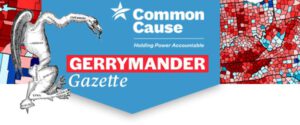Recap
Common Cause Wrapped 2024
Blog Post

Prohibitions Against Partisan Gerrymandering in Ohio’s Issue 1 Explained
Issue 1 is a proposed amendment to the Ohio Constitution that the state’s voters will see on the November ballot. It would strip politicians of the power to draw state legislative and congressional districts and create a new independent citizens redistricting commission. I recently joined a discussion on WOSU’s All Sides about Issue 1’s protections against partisan gerrymandering and some of the disinformation being peddled about this historic reform.
Anderson, Indiana City Council Violates the U.S. Constitution and Sends Taxpayers the Bill
The City Council in Anderson, Indiana has cost taxpayers $150,000 and counting in an effort to defend blatantly unconstitutional council districts that haven’t been updated since 1982. Voting districts at all levels of government must be redrawn after every decennial census to ensure that districts of the same type have equal population.

Common Cause Indiana, the Anderson-Madison County NAACP and the League of Women Voters of Indiana sued the City Council in federal court for violating its legal duty to establish new districts. The Council voted in December 2022 not to redraw its voting map even though the 2020 federal census showed unlawful population differences between districts.
The judge in the case approved a status conference requested by the plaintiffs to determine next steps. Although the Anderson City Council adopted an ordinance in June 2024 creating a new map, it did not rely on census data. Instead, City Council members walked around one district. Needless to say, that won’t do the trick.
Utah Court invalidates legislature’s attack on direct democracy
The Utah Supreme Court will hear oral arguments on September 25 about the Utah State Legislature’s attempt to weaken voters’ power to pass laws by ballot initiative. Last week, a trial court rejected ballot language designed to mislead voters about the effects of Amendment D, a proposed constitutional amendment legislators placed on the November ballot. Amendment D would allow the state legislature to defy the will of the voters by changing ballot initiatives even after voters approve them. Judge Dianna Gibson ruled that, “Utahns are entitled to an accurate summary of any proposed constitutional amendment that impacts their fundamental rights.” Her opinion also noted that the state failed to provide constitutionally required public notice of this amendment.
Amendment D is a direct response to voters’ success in the Utah Supreme Court defending Proposition 4, a 2018 ballot initiative led by Better Boundaries that created a new citizen advisory commission to draw voting maps and banned partisan gerrymandering. Following passage of Proposition 4, the legislature immediately attempted to undo this reform by eliminating its protections against partisan gerrymandering and empowering themselves to draw manipulated districts. Common Cause nagsampa ng amicus brief in the Utah Supreme Court supporting the plaintiffs who were protecting Proposition 4 from this attack. The Utah Supreme Court ruled in July that the legislature’s effort to steal back redistricting power violated the Utah Constitution. The state’s high court will now determine whether the legislature’s attempt to limit ballot initiatives will proceed.
Florida Supreme Court to Decide Fate of Congressional Map
Ang Korte Suprema ng Florida heard arguments last week in a lawsuit to overturn a congressional redistricting plan pushed by Gov. Ron DeSantis that diminished the political power of Florida’s Black voters.
Plaintiffs’ attorneys argued that the map violates the Florida Constitution’s Fair Districts Amendments, which prohibit drawing boundaries that diminish the ability of communities of color to elect candidates of their choice. The court’s ruling will not impact the 2024 elections.
Common Cause wins U.S. Building Trust Prize at World Justice Challenge

This summer, Common Cause’s campaign to reform redistricting across the country received the U.S. Building Trust prize at the World Justice Challenge 2024.
The World Justice Challenge recognizes exemplary projects for their potential for replication and their demonstrated impact in advancing the rule of law in four categories: electoral processes and transitions of government power; justice institutions; free media and trustworthy information; and youth engagement. Each of the five winning projects received a $20,000 cash prize and opportunities to network and build their global profile throughout the year. We are thrilled and humbled by this honor.
Ang newsletter na ito ay ginawa ng Common Cause at pinagsama-sama ni Dan Vicuna. Mag-subscribe sa Gerrymander Gazette dito. Para sa karagdagang impormasyon o upang magpasa ng balita, makipag-ugnayan Dan Vicuna.
Recap
Artikulo
Blog Post